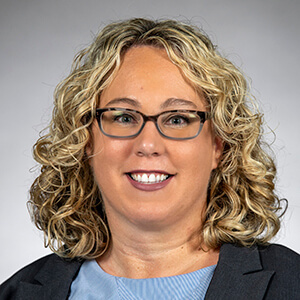Spring course examines climate change through economics and business ethics perspectives
Published: October 27, 2021 / Author: Laurel Clements '22
As climate change becomes an increasing concern worldwide, the need for understanding across disciplines is crucial. This spring, students from all majors will have the opportunity to examine climate change through the disciplines of business ethics and economics in the new course Climate, Economics, & Business Ethics.

Jessica McManus Warnell
Instructors Jessica McManus Warnell, associate teaching professor of Management & Organization, and Eva Dziadula, associate teaching professor of Economics, will lead the integration course, which will focus on environmental and social justice implications of climate change, public policy, and impacts on global economies and communities among other topics.
Below, McManus and Dziadula discuss the importance of integrating multiple perspectives in examining climate change and why Asia is critical to the larger picture.
Q: Climate change is often considered a scientific endeavor. How do your fields of study intersect with the topic of climate change?
ED: Economics is uniquely positioned as a social science to study climate change. We have the tools to quantify the costs and benefits associated with pollution and evaluate the trade-offs. We can explain why markets fail under these circumstances and how we can design a more effective policy to help mitigate the impacts. But the discipline also recognizes that it is extremely difficult to accurately capture all these aspects and we need to continue striving to do better.
JMW: Through teaching on sustainability, equity, and business ethics over the years, it has become increasingly clear that the grand challenges we face as a global community—particularly challenges to social and environmental sustainability—require multidisciplinary attention. The impact of business—its potential for enhancing community prosperity, as well as its potential for harm—is tremendous. From risk management, supply chain considerations and responsible use of resources to issues of management decision-making and leadership and the innovation and new opportunities sustainability can inspire, business and economics must be at the table as we consider impacts and responses to climate change.
Q: What were some of the key considerations you kept in mind when developing this course?
ED: Mostly, it was about how to integrate the two disciplines. We specialize in completely different areas and yet they are both extremely important in evaluating climate change. We need to understand the economics behind the decisions of individuals, firms, organizations, and governments. Why do they engage in the behaviors we observe? How do their actions impact communities around them and how do we measure that? How do we influence their actions with policy tools such as taxes? Yet the economic analysis alone doesn’t consider the ethical implications of these choices. Business ethics can help us think about the role of the stakeholders and who is responsible for the changes we observe in our world today. Should firms be held accountable? Should governments? Should individuals step up? The course will be offered to a mixed-major audience, so that is an exciting aspect of combining different approaches to teaching.
JMW: We learned early on that this type of a course is different from simply co-teaching—we need to be deliberate about allowing our work to inform each others’ and identifying materials and creating student activities that allow for consideration of the topics integrated lens—management and business ethics and economics. Studying economic analyses alongside implications for business in practice, and organizational and societal dimensions of effective, ethical business, illuminates both and adds an action orientation. I am really excited about what I’m learning from Professor Dziadula, and I think our students will appreciate the integrated approach!

Eva Dziadula
Q: This course was developed with support from the Liu Institute for Asia and Asian Studies. In what ways do Asian Studies intersect with the course?
ED: Asia is affected by so many aspects of climate change. China and India’s issues with air and water pollution, rising sea levels, impact peoples’ lives every day. We want to look at the role of stakeholders in the process of adaptation and resilience. Some of my research focuses on child labor in Nepal. I visited right after the earthquakes in 2015 and witnessed the complete devastation. The lack of infrastructure to provide assistance was overwhelming. Professor McManus has spent time researching community resilience after the triple disaster in Fukushima, Japan. We can draw on our experiences in creating a course engaging students with some of the most pressing and difficult-to-answer questions of our time.
JMW: Any study of global climate change implications requires a substantive analysis of Asia, which represents the world’s largest populations, most significant emissions contributions outside the United States, and lowest air and water quality. Asia is the largest market suffering from the negative externalities associated with development and has the greatest potential for positive policy and practice impact. Asia is critical as a focus for any examination of global economies, business policy and practice, and social and environmental justice. As faculty fellows of the Liu Institute, Professor Dziadula and I will integrate our teaching and research experiences in Asia, specifically in China, Nepal, and Japan.
Q: How did you become interested in Asia? Why do you think it is important for students to have an understanding of Asia?
ED: I had the opportunity to teach in Hong Kong for the first time in 2012 and instantly fell in love! The city is vibrant, mixing traditional Chinese culture with the most modern aspects of today’s life from technology, architecture, to a fierce business environment. And it has beautiful ocean views and amazing food! I traveled around mainland China as well and the rich history is amazing. In my research, I am interested in the fertility of immigrants in the US and look at Asian moms specifically. I measure whether they assimilate culturally by changing the strong preference for boys. I find the subject fascinating, so in order to stay engaged and share my interest with my students, I developed the study abroad course Economic Demography of China a few years ago. We travel around the country, learning first-hand about the implications of demographic changes. Asia is an incredibly large market that continues to grow, and the opportunities there are endless.
JMW: My interest in Asia was sparked most significantly when I had the opportunity ten years ago to serve as a visiting research and teaching fellow at Reitaku University near Tokyo. Japan allows scholars and students to examine alternative models of capitalism which some have called collective capitalism, characterized by greater social protections and relational markets. I took groups of our students to Tokyo for a course on business and culture in Japan for several years. In our visits, engagements with Japanese scholars and business people, it became clear that we needed to look at Fukushima. Fukushima is arguably the most significant environmental disaster in recent memory, a clear example of environmental and man-made disaster and its ramifications. Examining its lessons is more important now than ever as extreme weather events proliferate in the context of climate change.
Q: What would you like potential students to know about this course?
ED: Come ready to be challenged and to have a conversation. Don’t expect black and white answers and be ready to engage in designing creative solutions. Professor McManus is working on possible partnerships with organizations willing to seed-fund good ideas! We are also talking to a few organizations who focus on decarbonization to see if we can get them involved with our class. We know it will be a great and engaging course!
JMW: This course is for students who share our interests in the role of business in society with respect to climate change, and we look forward to examining these issues together. We’re working hard to incorporate interesting guest experts who can illuminate their fields and to develop hands-on opportunities for students in the class, using real data to formulate policy proposals and engaging in experiential learning with NGO or corporate partners.
Climate, Economics, & Business Ethics is offered in two sections:
Monday and Wednesday, 8–9:15 a.m.
Monday and Wednesday, 9:30–10:45 a.m.
MGTO 30800 / ECON 30533 / ASIA 30800 / SUS 30800 / ENER 30800
Originally posted on ND Liu Center for Asian Studies News.




